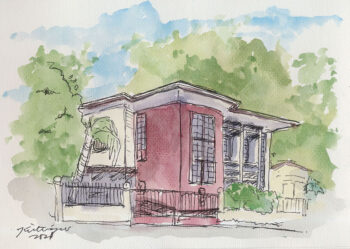ISABELA, Basilan (MindaNews / 20 January) — Bismillah hir rahman ir raheem. I seek forgiveness if what I am about to say is wrong or transgresses anyone. I only seek to remind foremost myself. I won’t speak of Mr Robin Padilla’s behavior towards the Korean. Because this is not about him. But let me take advantage of this issue and speak of why it is not right to continue allowing the imposition of other languages on us instead of calling those whom we welcome to our homeland to learn and speak our own.
This has been an advocacy I’ve taken on as shown in my FB post before the PGT (Pilipinas Got Talen) incident. If we find arrogance in Robin’s behavior, then the more that we should find arrogance in one who refuses to learn our language, despite all opportunities to do so.
I am a Moro. We are 13 ethnolinguistic groups, our identity and territory comes with our own language. When the colonizers came, one of the first things they did was impose their language on us, forcing us to speak their tongue so we may be understood. They changed our words, they changed our thoughts, they changed our narrative.. everything about us they spoke according to their terms. When our own brothers and sisters from the Luzon and Visayas migrated and settled in our homeland, many of them failed to learn our language. It was us who had to learn theirs so we may understand each other. No offense meant but this is our reality.
Even among us Moro, we inherited this colonizing attitude. I am a Tausug (people of Sulu) speaker who grew up in Basilan, the home of the Yakans but to this day I can only speak a few Yakan words, even if I have Yakan ancestry. And I am totally ashamed of myself. In my ignorant days, I’d be surprised to meet a Yakan who can’t speak Tausug, as if it is incumbent upon them to learn and speak my own, right in their own territory. They are asked why they can’t speak Tausug or laughed at if they struggle to do so, or considered stupid if they can’t pronounce well or are grammatically wrong. Don’t get me wrong, I love my Tausug tongue, but this is about the equality of all languages, and therefore, the equality of people. Thus, my admiration to friends who learn or at least try to learn, the language of the community they choose to live with. I know of a famous Canadian youtuber who speak Bisaya almost perfectly!
When one refuses to learn the language of the people he/she chooses to live with, does it not speak of his/her respect for that people? Worse, does it not speak of a feeling of superiority, knowingly or not? And this influenced our consciousness. We have 70-75 languages in this country, but those who can’t speak English or Tagalog well are considered of lesser intellect. A colonial mentality we must unlearn.
If this is not enough to convince us of how important it is to protect our language and not allow other languages to dominate us, then let me tell you the story of the Sulu Sultanate – our story, my story.
On August 20,1898 American Brigadier General John C. Bates and Sultan Jamalul Kiram signed the Kiram-Bates Treaty, declaring the sovereignty of the United States over the Sulu archipelago, with the US pledging to respect the rights and dignities of the Sultan and datus, to not interfere in the local practice of Islam, their social customs and governance. The Agreement accordingly was written in Arabic, which the Sultan can read but in the English language which he did not understand and was only translated to him. But now we know that we were lost in translation. “Retrospectively to some scholars, the Agreement was structurally undermined by mistranslations across the languages used in the documents.” (Marian Pastor Roces, Events Pertinent to the Violent Politics of Identity in 20th Century Mindanao Annotated Timeline). We lost our kingdom which existed 493 years before that day, our identity and freedom, because the colonizers refused to speak our language.
And we allowed it.
(MindaViews is the opinion section of MindaNews. Sitti Djalia Turabin represented Anak Mindanao party-list group in Congress from June 30, 2013 until she resigned in early October 2017 to focus on community work, especially among the youth in conflict areas in Mindanao. This piece first appeared on her FB page on January 19. MindaNews was granted permission to publish).







